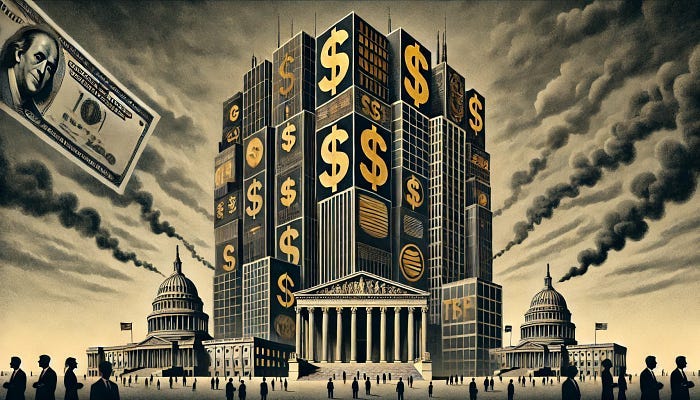America’s Corporate Fascism
A Historical and Structural Analysis
Introduction The term "corporate fascism" evokes images of authoritarianism intertwined with powerful corporate influence. Although the U.S. government operates as a democratic republic, critics argue that corporate interests exert disproportionate power over policy-making, social structures, and economic priorities, creating a dynamic that feels more oligarchic or corporatized than democratic. The following analysis explores how this shift has unfolded, tracing its roots back to key moments in American history, from the early 20th century to today.
1. The Early Foundations of Corporate Power (1800s - 1930s)
From the Industrial Revolution onwards, the rise of corporations was spurred by the development of massive industries such as steel, oil, and railroads. Figures like John D. Rockefeller, Andrew Carnegie, and J.P. Morgan amassed unprecedented wealth and power. The creation of trusts allowed monopolistic control over essential industries, laying the groundwork for corporate consolidation.
The federal government made some attempts to limit these powers with antitrust laws, notably the Sherman Antitrust Act of 1890 and the Clayton Antitrust Act of 1914. Despite these efforts, corporate influence persisted, even deepening during the 1920s’ economic boom. By the 1930s, however, the Great Depression led to widespread skepticism about unchecked corporate power.
References:
Kolko, G. (1963). The Triumph of Conservatism: A Reinterpretation of American History, 1900–1916. The Free Press.
Perkins, J. (2004). Confessions of an Economic Hitman. Berrett-Koehler Publishers.
2. Post-World War II Growth and the Rise of the Military-Industrial Complex (1940s - 1970s)
The post-World War II era marked the rise of the military-industrial complex, a term famously introduced by President Dwight D. Eisenhower in his 1961 farewell address. He warned of the undue influence of an industrial sector intertwined with defense spending and policymaking. This complex became a pillar of American economic growth, fueling corporate contracts and private sector expansion in everything from defense to aerospace.
In the 1970s, major corporations influenced foreign policy significantly, particularly in resource-rich areas. Government and corporate partnerships sought to control global resources, especially oil, leading to close collaborations that left local interests sidelined in favor of profit.
References:
Eisenhower, D. D. (1961). Farewell Address to the Nation.
Schlosser, E. (2004). Fast Food Nation: The Dark Side of the All-American Meal. Houghton Mifflin Harcourt.
3. Deregulation and Neoliberalism (1980s - 2000s)
The 1980s ushered in a wave of neoliberal policies under the Reagan administration, promoting deregulation, tax cuts, and privatization. This shift was marked by the belief that “government is not the solution to our problem; government is the problem.” Policies of this era dismantled financial regulations, epitomized by the repeal of the Glass-Steagall Act in 1999 under the Clinton administration, allowing banks to engage in speculative activities previously restricted.
As corporations increasingly influenced legislation and weakened regulatory frameworks, they gained greater freedom to operate with minimal oversight. Lobbying became a powerful tool, with corporations using political action committees (PACs) to shape policy according to their interests, often to the detriment of labor rights and environmental protections.
References:
Harvey, D. (2005). A Brief History of Neoliberalism. Oxford University Press.
Stiglitz, J. E. (2012). The Price of Inequality: How Today’s Divided Society Endangers Our Future. W.W. Norton & Company.
4. The Supreme Court and Corporate Personhood (Citizens United, 2010)
A turning point in corporate influence over American politics was the Citizens United v. FEC Supreme Court decision in 2010, which ruled that corporations have the same free speech rights as individuals. This ruling allowed corporations to spend unlimited money on political campaigns, amplifying their political power. Since then, corporate spending in politics has increased dramatically, with billions of dollars flowing into elections to support candidates aligned with corporate interests.
This landmark decision reinforced the concept of “corporate personhood,” originating with the 1886 Santa Clara County v. Southern Pacific Railroad case, which interpreted corporations as "persons" under the 14th Amendment. Over time, this legal framework provided corporations with significant rights, transforming them into powerful political entities.
References:
Mayer, J. (2016). Dark Money: The Hidden History of the Billionaires Behind the Rise of the Radical Right. Doubleday.
Kalleberg, A. L. (2011). Good Jobs, Bad Jobs: The Rise of Polarized and Precarious Employment Systems in the United States, 1970s to 2000s. Russell Sage Foundation.
5. The COVID-19 Pandemic and Corporate Consolidation (2020s)
The COVID-19 pandemic accelerated corporate consolidation as smaller businesses struggled and large corporations leveraged federal relief and bailouts. Major players in e-commerce, pharmaceuticals, and technology thrived, amassing record profits. Government stimulus and relief programs largely benefited large corporations and financial markets, while small businesses and lower-income workers faced prolonged economic hardship.
At the same time, corporate technology giants like Google, Amazon, Facebook, and Microsoft gained unprecedented access to data and expanded their influence over daily life, from work to communication. The power and reach of these entities have led some critics to argue that corporations now wield as much, if not more, influence than the government itself.
References:
Giridharadas, A. (2018). Winners Take All: The Elite Charade of Changing the World. Knopf.
Kessler, A. (2020). The Business of America Is Lobbying: How Corporations Became Politicized and Politics Became More Corporate. Oxford University Press.
Conclusion: From Democracy to Corporate Oligarchy?
The trajectory of American corporate power has raised significant concerns about the nation’s democratic integrity. Critics argue that corporations are shaping policies to such an extent that citizens' voices are increasingly drowned out, resulting in a state where corporate interests often supersede the public good. Whether through legal protections like Citizens United, lobbying, or economic consolidation, the increasing overlap between corporate power and government functions challenges the principles of democratic representation.
This reality calls for a reassessment of corporate influence and potential reforms to ensure that governance remains rooted in public accountability rather than corporate profit.


